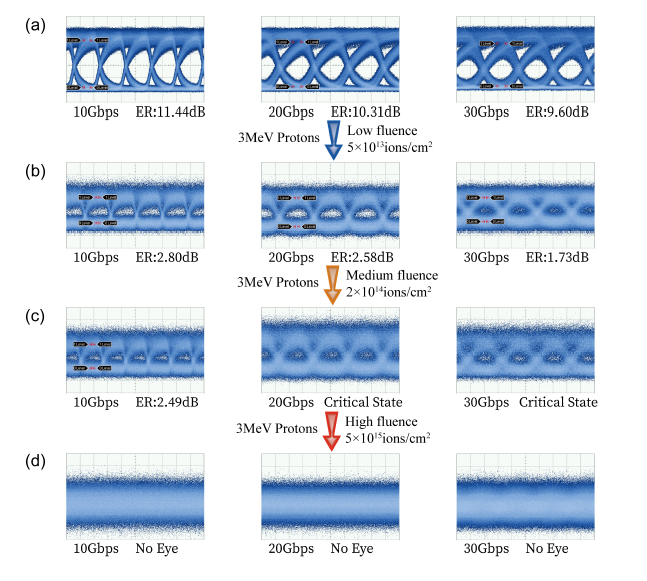The article "Proton radiation effects on high-speed silicon Mach-Zehnder modulator for space application" by Changhao Han, a doctoral student and others at the center was recently published in SCIENCE CHINA Information Sciences.
Oriented to future space applications, this work successfully carried out the proton radiation resistance experiments of silicon-based Mach Zwendel modulators for the first time, investigated the proton radiation resistance performance of silicon-based modulators in space applications, and demonstrated the changes in the device performance with the stepwise increase in the radiation injection presented. Proton is the most abundant radiation particle in the space environment and the study of proton radiation is of immense significance for space applications. In this study, protons with an energy of 3 MeV and three gradient injections are used to simulate the operating conditions of devices in spacecraft that operate continuously for decades in a high radiation environment in space.
The experimental results illustrate that the silicon-based modulator is very sensitive to proton radiation, and the modulation efficiency decreases significantly after radiation, and the degree of decrease increases significantly with the rise of injection volume. The changing response of the eye diagram in the data transmission experiments corresponds to the modulation efficiency. As the radiative injection rises, the modulator operating state shifts from still operating to a critical state and finally to complete failure. Meanwhile, the mechanism of proton radiation is analyzed based on the results of simulation and experiment, and proton radiation causes both displacement damage and ionization damage, which significantly degrades the performance of the silicon-based modulator.

As an important exploration of the practical application of silicon-based optoelectronics technology in the space field, this study successfully carry out the proton radiation-resistant experiment of silicon-based modulator for the first time, and the performance of the device decreases significantly with the rise of radiation injection. The experimental phenomena produced by the different radiation injections in the experiments show a clear progressive pattern, presenting different operating states of the devices. This work is of great significance for practical space applications and can provide an important reference value for the deployment of silicon-based optoelectronics in aerospace and other fields.
The main collaborators of the above work include Prof. Fu Engang from School of Physics, Peking University, and Researcher He Yandong from School of Integrated Circuits, Peking University. This work was supported by the National Key Research and Development Program of China, the National Natural Science Foundation of China, and the Key Research and Development Program of Beijing Science and Technology Commission.
Link to the original paper:
https://www.sciengine.com/SCIS/doi/10.1007/s11432-022-3556-0

